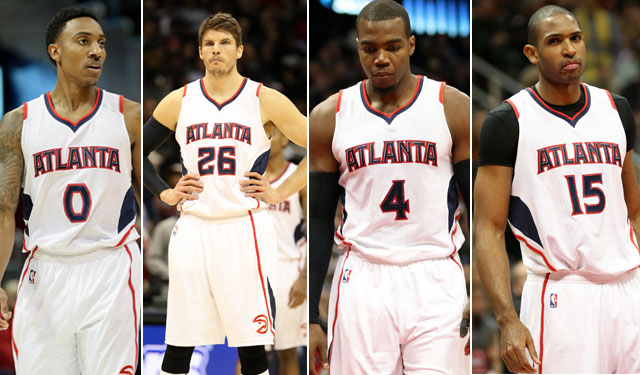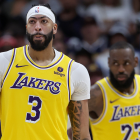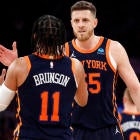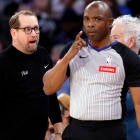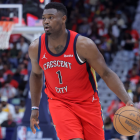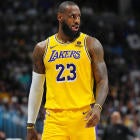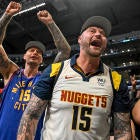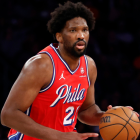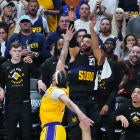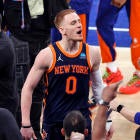During the 2005-06 season, the Detroit Pistons were enjoying another spectacular regular season. They were coming off back-to-back NBA Finals appearances with one championship and a roster of complementary players was fueling their success. There wasn't one superstar; rather it was a team effort that made them so impossible to handle.
Ben Wallace and Rasheed Wallace were protecting the paint and dominating the boards. Chauncey Billups and Richard Hamilton controlled the scoring on the perimeter and Tayshaun Prince was the glue guy on a team full of them. The Pistons were cruising into All-Star weekend with a record of 42-9 and were being rewarded by opposing coaches around the East with four All-Star selections. Detroit really wanted its entire starting five selected, but Prince never received that honor.
With 3:38 left in the first quarter of the 2006 All-Star Game, Billups, Hamilton, and both Wallaces checked into the game. It was a cool moment rewarding a team that wasn't identified by a star. Nearly a decade later, it only seems right that we'd see this same moment recreated this season for the Atlanta Hawks.
A perfect storm allows it. The quality of the Eastern Conference is low, maybe the lowest we've seen in decades. The star power and the quality of teams have fallen while the Hawks have been building toward becoming a truly successful team under Mike Budenholzer. After winning their 12th straight game, the Hawks hit the halfway point at an East-leading 33-8 (the 32-6 Golden State Warriors have played three fewer games and have a higher winning percentage, .842 for Golden State, .805 for the Hawks).
The Hawks' success comes from a system similar to the champion Spurs with a roster more relatable to that 2006 Pistons team. Success sprouts from the team concept, but the core of Jeff Teague, Kyle Korver, Paul Millsap, and Al Horford has been good enough to warrant all four being selected to the 2015 All-Star Game at Madison Square Garden.
We still have a couple weeks to go before All-Star rosters are decided, but the starting five of John Wall, Dwyane Wade, LeBron James, Carmelo Anthony, and Pau Gasol appears to be a lock with voting results. Outside of that starting five, Kyle Lowry and Jimmy Butler should be locks for the festivities. That leaves five spots left in the East and this Hawks quartet's credentials seem as good as anybody's.
Teague is fourth in the East in Player Efficiency Rating, behind LeBron, Wade, and Hassan Whiteside. His averages of 17.3 points (eighth among East guards), 7.3 assists (third among East guards), and 1.8 steals (third among East guards) all help him qualify, as does his 48.5 percent (also third) from the field. He's been a better, more consistent player than Kemba Walker and Derrick Rose.
The argument between Teague and Kyrie Irving could be decided by contribution to team success, as well. Teague also has the highest net rating differential (plus-12.6 points per 100 possessions) than Irving (plus-12.4), Walker (plus-1.3), and Rose (minus-2.2).
Millsap's case is helped by the fact that he's been arguably the best forward in the East who won't be voted into the starting lineup. LeBron, Anthony, and Gasol all have higher PERs, but outside of them, only Greg Monroe has a higher PER than Millsap among East forwards. Millsap is seventh in East scoring for forwards and fifth in rebounds. He also leads East forwards in steals and leads East power forwards in assists.
He should be a lock, simply because there isn't much competition for East forwards, especially when you consider Chris Bosh has been a center almost all season for Miami.
The center position is where it gets tricky for someone like Al Horford. Because the All-Star positions are now "guards" and "frontcourt," centers aren't necessarily recognized. Since the forwards in the East are weak, we'll have plenty of centers vying for those frontcourt selections. Horford will be battling Bosh, Andre Drummond, Nikola Vucevic, and Al Jefferson (although his injury could keep him out). Horford's defense has been hard to quantify in raw numbers, especially with only 1.4 blocks and 0.6 steals per game.
He's also a fairly weak rebounder (6.6 per game) for the position with the Hawks ranking 29th in offensive rebound rate and 17th in defensive rebound rate. His 15 points per game is fourth among centers, behind Bosh, Vucevic, and Jefferson. Horford's defensive hedging, recovery, and spacial awareness are so good that you want to forgive the numbers that don't blow you away. He's also one of the best passing big men in the East with 3.1 assists per game (only Joakim Noah averages more as a center).
This is where you start wondering if the argument of how good the Hawks have been this season starts discounting guys like Vucevic and Drummond, who are putting up flashier stats on losing teams. I've never been a huge fan of saying a team's wins matter more, but I also think numbers don't capture how instrumental Horford is to what this team does.
As for Korver, his spacing, shooting, movement, and passing almost mean more to the Hawks than any of his teammates. He embodies exactly what Budenholzer coaches his team to do. Play hard basketball with a high awareness and intelligence that allows you to make the right play or rotation no matter the situation. That's Korver this season. The Hawks are a minus-3.4 per 100 possessions with him on the bench, and a team best plus-12.3 with him on the floor.
His averages of 12.9 points, 4.2 rebounds, and 2.9 assists don't mesmerize you, but his 53.6 percent from 3-point range does. It also mesmerizes opposing defenses and flat-out terrifies them into scrambling away from the rest of the team, which opens up everything for Budenholzer's offense. His 3-point accuracy is the greatest in NBA history through the first 41 games, according to Elias Sports.
He's the only player in NBA history to attempt at least five 3-pointers per game while hitting more than 50 percent of them. In fact, he's the previous record holder (along with Steve Novak) at 47.2 percent. He'd be shattering that level of volume and accuracy from a historical perspective if he keeps this up. With Korver, you're starting to argue about whether Irving or Victor Oladipo has been a bigger or better All-Star.
Two All-Stars for the Hawks seems to be a lock, and the conversation of three is certainly to be had. But the East coaches granting them four All-Stars isn't out of the question, nor should it be dismissed. Teague and Millsap have earned this, and I believe Horford and Korver should as well. They're All-Stars at their positions and in their roles. They're doing it on a team that has the best record in the East and has been unstoppable since Thanksgiving. And it's in a conference that hasn't warranted much positive discussion outside of what Atlanta has done for two months.
The real arguments against this are strictly "counting stats" or that it would look weird to have four players from one team coming off the bench. But we've seen this before. We saw it nine years ago in Houston when the Pistons' four All-Stars all checked into the game together.
Right now, if you go away from the big names and focus on the right names, the Hawks have set themselves up for another ceremonious substitution in less than a month when the East goes to their bench and sees a quartet of Hawks ready to check in.
